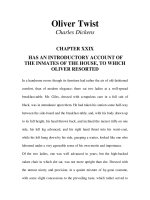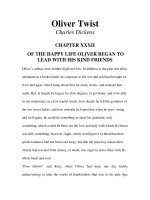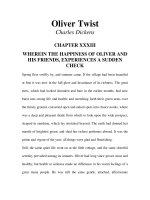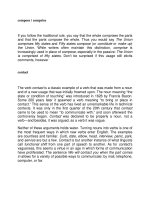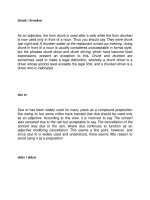Tài liệu Cách dùng tiếng Anh P5 ppt
Bạn đang xem bản rút gọn của tài liệu. Xem và tải ngay bản đầy đủ của tài liệu tại đây (61.65 KB, 7 trang )
compose / comprise
If you follow the traditional rule, you say that the whole comprises the parts
and that the parts compose the whole. Thus you would say The Union
comprises fifty states and Fifty states compose (or constitute or make up)
the Union. While writers often maintain this distinction, comprise is
increasingly used in place of compose, especially in the passive: The Union
is comprised of fifty states. Don’t be surprised if this usage still elicits
comments, however
contact
The verb contact is a classic example of a verb that was made from a noun
and of a new usage that was initially frowned upon. The noun meaning “the
state or condition of touching” was introduced in 1626 by Francis Bacon.
Some 200 years later it spawned a verb meaning “to bring or place in
contact.” This sense of the verb has lived an unremarkable life in technical
contexts. It was only in the first quarter of the 20th century that contact
came to be used to mean “to communicate with,” and soon afterward the
controversy began. Contact was declared to be properly a noun, not a
verb—and besides, it was argued, as a verb it was vague.
Neither of these arguments holds water. Turning nouns into verbs is one of
the most frequent ways in which new verbs enter English. The examples
are countless and familiar. Curb, date, elbow, head, interview, panic, park,
and service are but a few. Contact is but another instance of what linguists
call functional shift from one part of speech to another. As for contact’s
vagueness, this seems a virtue in an age in which forms of communication
have proliferated. The sentence We will contact you when the part comes
in allows for a variety of possible ways to communicate: by mail, telephone,
computer, or fax
continual / continuous
These adjectives are sometimes confused because their meanings overlap.
Both words can be used to mean “continuing without interruption”: living in
a continual state of fear, enjoying a continuous state of peace. But
continual usually refers to something that recurs or is interrupted
periodically: the continual pounding of the surf, the continual banging of the
shutters in the wind. Only continuous is used to refer to physical
continuation: The fans formed a continuous line around the field
continuance / continuation
Both of these words mean “the act or fact of continuing,” but only
continuance is used to refer to the duration of a state or condition, as in his
continuance in office. Continuation applies especially to prolongation or
resumption of action (a continuation of the meeting) or to physical
extension (the continuation of the street). The continuation of a story is that
part of the story following a break in its narration
convince / persuade
According to a traditional rule, convince is used to indicate mental
acceptance, and persuade to indicate mental acceptance followed by
action. Thus you convince someone of the truth of a statement or
proposition but persuade someone to do something. By extension you use
convince, but not persuade, with a that clause. Thus you should say By
convincing me that no good could come of staying, he persuaded me to
leave.
If you accept this distinction, then you should not use convince with an
infinitive: He persuaded (not convinced) me to go. In an earlier survey, a
majority of the Usage Panel upheld this distinction. But the use of convince
with an infinitive has become increasingly common even among reputable
writers. In addition, both persuade and convince see frequent use with that
clauses to indicate the acceptance of truth: I convinced (or persuaded) the
receptionist that the matter was urgent. Thus, the traditional rule does not
appear to have much of a future.
could care less / couldn’t care less
could care less! you might say sometime in disgust. You might just as
easily have said I couldn’t care less and meant the same thing! How can
this be? When taken literally, the phrase I could care less means “I care
more than I might,” rather than “I don’t care at all.” But the beauty of
sarcasm is that it can turn meanings on their head, thus allowing could care
less to work as an equivalent for couldn’t care less. Because of its
sarcasm, could care less is more informal than its negative counterpart and
may be open to misinterpretation when used in writing.
definite / definitive
Definite and definitive both apply to what is precisely defined or explicitly
set forth. But definitive most often refers specifically to a judgment or
description that serves as a standard or reference point for others, as in the
definitive decision of the court (which sets forth a final resolution of a
judicial matter) or the definitive biography of Nelson (i.e., the biography that
sets the standard against which all other accounts of Nelson’s life must be
measured).
deprecate / depreciate
The first and fully accepted meaning of deprecate is “to express
disapproval of.” But the word has steadily encroached on the meaning of
depreciate. It is now used, almost to the exclusion of depreciate, in the
sense “to belittle or mildly disparage,” as in He deprecated his own
contribution
different from / different than
The phrases different from and different than are both common in British
and American English. The British also use the construction different to.
Since the 18th century, language critics have singled out different than as
incorrect, though it is well attested in the works of reputable writers. If you
want to follow traditional guidelines, use from when the comparison is
between two persons or things: My book is different from (not than) yours.
Different than is more acceptably used, particularly in American usage,
where the object of comparison is expressed by a full clause: The campus
is different than it was twenty years ago. You can use different from with a
clause if the clause starts with a conjunction and so functions as a noun:
The campus is different from how it was twenty years ago
Sometimes people interpret a simple noun phrase following different than
as elliptical for a clause, which allows for a subtle distinction in meaning
between the two constructions. How different this seems from Paris
suggests that the object of comparison is the city of Paris itself, whereas
How different this seems than Paris suggests that the object of comparison
is something like “the way things were in Paris” or “what happened in
Paris.”
discreet / discrete
As an individual, you might be discreet, but you are definitely discrete.
Discreet means “prudent in speech and behavior”: He told me the news but
asked me to be discreet about it. The related word discrete means
“separate, distinct”: The summer science program consists of four discrete
units
distinct / distinctive
A thing is distinct if it is sharply distinguished from other things; a property
or attribute is distinctive if it enables us to distinguish one thing from
another. The warbler is not a distinct species means that the warbler is not
a clearly defined type of bird. The warbler has a distinctive song means that
the warbler’s song enables us to distinguish the warbler from other birds
dive



